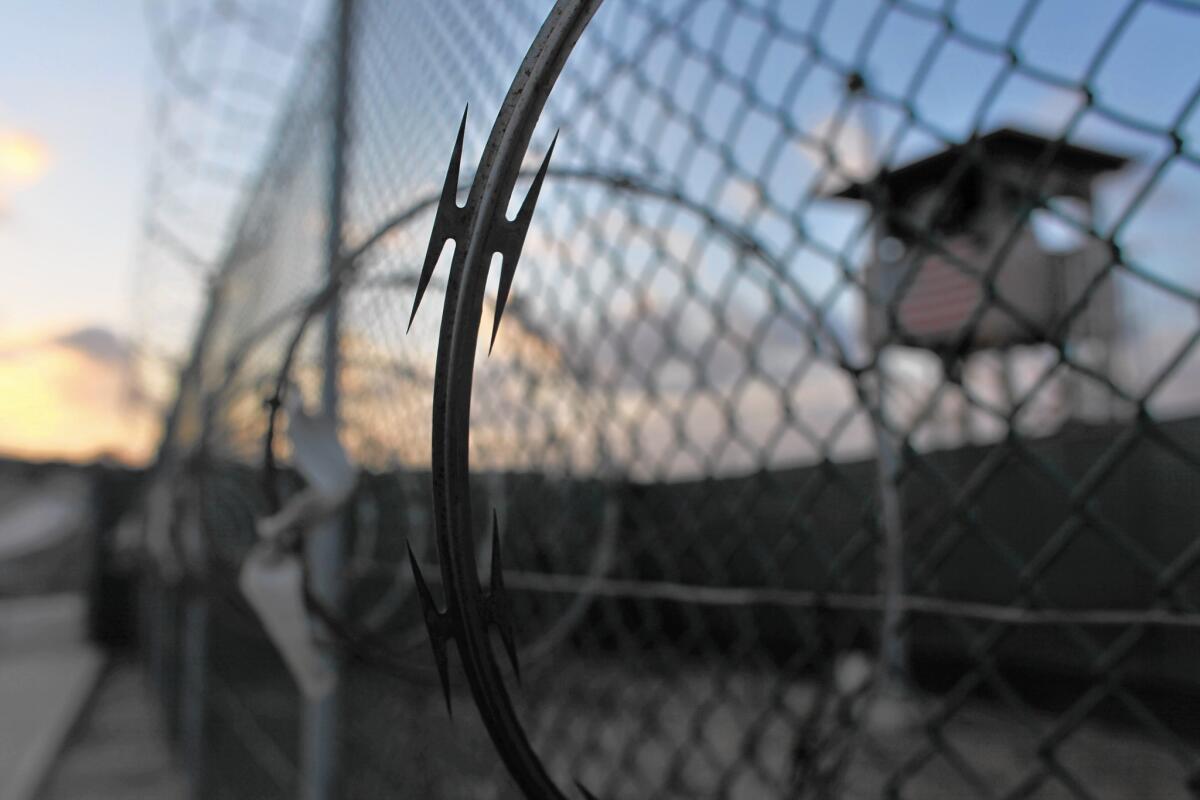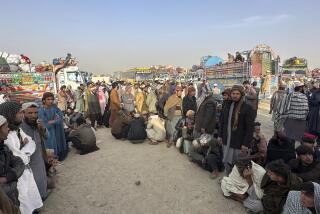Family fears that Afghan prisoner at Guantanamo will be forgotten

For 12 years, Obaidullah’s family has watched the release of more than 200 Afghan detainees from the U.S. prison at Guantanamo Bay, Cuba.
Obaidullah and many others were captured as young men in the mainly Pashtun areas of eastern and southern Afghanistan. The Taliban negotiated the release of some captives, such as the five freed last year as part of a swap for U.S. prisoner of war Sgt. Bowe Bergdahl.
But Obaidullah’s turn has not come. Captured at 19 at his home in the eastern province of Khowst, two days after the birth of his daughter, he is one of eight Afghans still held at Guantanamo — among the 122 prisoners remaining — as President Obama’s pledge to close the detention center runs into political obstacles in Washington.
His attorneys said they have “exhausted all potential remedies” in court. Obaidullah, who has one name, has steadfastly denied U.S. allegations that he was a member of an Al Qaeda bomb cell, and a military officer assigned to his case in 2011 found new evidence that his lawyers say exonerates him.
But federal judges, most recently in 2012, have upheld the U.S. government’s ability to hold Obaidullah, now about 31, prisoner without charges.
His lawyers say he is too small a fish to be part of any prisoner release agreement involving the United States, the Afghan government and the Taliban. With few options, Obaidullah has turned his energy to writing poetry inspired by his experiences, which include time as a refugee in a Pakistani camp during the Soviet occupation of Afghanistan, as a shopkeeper in Khowst under Taliban rule and as a prisoner at Guantanamo.
In a 2011 poem, he wrote:
Singing nightingales are following the caravan,
And with their childish and delicate tongues sing sweet melodies,
They are disgusted with the murders and oppressions humankind commit.
Obaidullah’s saga began on a summer evening in 2002 when about two dozen U.S. special forces troops raided his family home. The commandos allegedly found 23 antitank mines and seven empty shells buried under 3 feet of dirt, and a Toyota Corolla containing dried blood that U.S. officials cited as a sign that the car was used to transport Taliban fighters.
U.S. officials also found a notebook in his pocket that included diagrams of the wiring of improvised explosive devices.
Obaidullah’s family members say the notebook was given to him when he was conscripted into a Taliban-run military school, like most young men at the time. They say the U.S. government has failed to acknowledge subsequent entries, mostly accounts of selling pots and pans at his shop to support his family.
A military lawyer assigned to his defense team, Navy Lt. Cmdr. Richard Pandis, conducted an investigation in Khowst in 2011 and found evidence that he said supports the family’s contention that the mines had been left over from the Soviet occupation, while they were in Pakistan.
The blood residue in the car, Pandis said, probably belonged to Obaidullah’s pregnant wife, who had been taken in the car to the hospital to give birth to their daughter.
Obaidullah’s lawyers say the U.S. claims that he was an Al Qaeda member were far-fetched.
“Anyone who knows anything about Al Qaeda knows they wouldn’t recruit a 19-year-old Afghan who lived at home,” said Maj. Derek A. Poteet, a military lawyer assigned to Obaidullah’s defense team. “It’s an organization comprised primarily of Arabs.”
A 2008 Pentagon assessment labeled Obaidullah a high-level, Al Qaeda-allied insurgent who was planning to plant explosives on the road leading to the airport in Khowst. Justice Department lawyers say he was “plainly a member of an Al Qaeda bomb cell.”
U.S. officials say Obaidullah confessed to crimes while in custody at Bagram, Afghanistan, where he was held for more than 90 days after his arrest. But at Guantanamo, Obaidullah recanted, saying he had confessed under harsh interrogation methods that his lawyers described as torture.
In 2013, Obaidullah joined more than 160 detainees in a hunger strike, during which he lost 40 pounds in five months. Fazel Karim, Obaidullah’s brother, said the strike helped draw worldwide attention to the treatment of Guantanamo detainees, who were banned from participating in communal prayers.
“He lost the right to practice his religion,” Poteet said.
Obaidullah remains in detention even though the government’s preliminary charges against him, including conspiracy and material support for terrorism, were dropped in 2011. As U.S. forces withdraw from Afghanistan, Obaidullah’s mother — whose health has deteriorated during his detention — worries that her son may be forgotten.
“She is worried that her son will never return home and that those still in detention will just disappear,” Karim said.
Eight Afghan detainees have died at Guantanamo. Of those, at least one apparently committed suicide and another died as a result of injuries sustained while in U.S. custody in Afghanistan.
Obaidullah’s relatives have appealed to Afghan officials, including former President Sibghatullah Mojadidi, but have repeatedly been told that the issue is a “U.S. matter.”
Obama’s efforts to close Guantanamo by releasing or transferring prisoners to other countries have hit a series of roadblocks. Some Republican lawmakers have called for keeping the prison open, mostly recently after a militant attack on the offices of the satirical magazine Charlie Hebdo in Paris, police and a kosher market that left 17 people dead.
“Now is not the time to be emptying Guantanamo,” Sen. Kelly Ayotte (R-N.H.) said in January. A bill sponsored by Ayotte that would bar most transfers of detainees passed the Senate Armed Services Committee in February, but Obama has said he would veto such legislation.
In 2013 the Obama administration included Obaidullah among dozens of prisoners who would receive hearings before a Periodic Review Board to determine whether they should continue to be held. But, like most of the others, Obaidullah has not had a hearing yet.
Obaidullah’s daughter, Mariam, now 12, has seen him only on a computer screen. The International Committee of the Red Cross has set up periodic Skype meetings, but relatives say Mariam longs for his physical presence.
“She cries out in her dreams for her father,” Karim said.
Latifi is a special correspondent.
More to Read
Start your day right
Sign up for Essential California for news, features and recommendations from the L.A. Times and beyond in your inbox six days a week.
You may occasionally receive promotional content from the Los Angeles Times.






